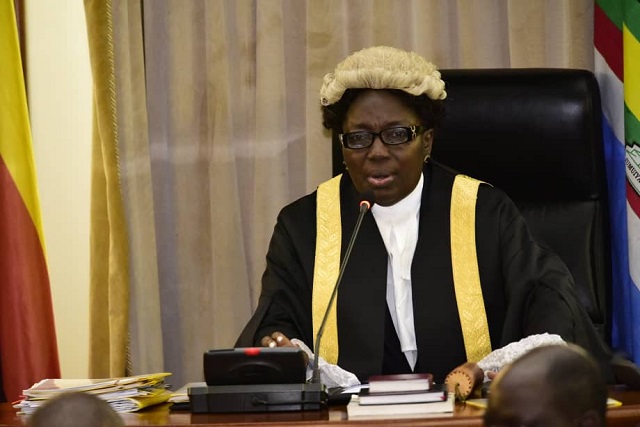
Kampala, Uganda | THE INDEPENDENT | Parliament has passed the Presidential Elections Amendment Bill, 2019.
The new law seeks to among others amend the Presidential Elections Act, 2005, prescribe the period for holding presidential elections and the time for campaigns and provide for the electronic transmission of results.
It also aims at conforming to the ten recommendations of the Supreme Court in the 2016 presidential election petition and the Constitutional Amendment Act, 2018 which lifted the age limit cap for presidential candidates, extended the time for filing election petitions, hearing of petitions and the period for holding presidential by-elections when an election is nullified.
On Thursday, Parliament passed the Bill with amendments to some proposals particularly on election period, campaign time, sources of election campaign funds and also the eligibility criteria for independent candidates.
The provisions passed include the one that requires the Supreme Court to declare it’s findings and reasons for a presidential election petition within 45 days. This is because presidential elections shall be held 120 days before the expiry of the term of the President. This is an extension from the current 90 days so as to provide more time for considering election petitions and also holding by-elections in the event that elections are nullified.
Also candidates and their agents will now campaign from 7 am to 6 pm. The current law gives Electoral Commission powers to determine the campaign time and period for candidates. In 2016, EC capped the campaign time to 6 pm. The new law however has prescribed the specific campaign time.
However, the decision was made after a sharp debate because MPs led by Budadiri West MP Nandala Mafabi and Kayunga Woman MP Idah Nantaba supported the 7am-7pm time frame while Kamuli Municipality MP, Rehema Watongola supported the 7am-6pm proposal.
Nantaba however insisted that presidential candidates need more time but her argument was shot down by the Speaker Rebecca Kadaga with the view of being considerate to the people who attend campaigns.
The Busongora South MP William Nzoghu and Kampala Central MP Muhammad Nsereko however noted that the provision should only apply to open rallies because candidates are expected to campaign at least a day per district.
Erute South MP Jonathan Odur also proposed penalties for a candidate or agent who is found campaigning at 6:30 pm.
Parliament passed the proposal without considering Nzoghu, Nsereko and Odur’s suggestions. The House also passed the proposal that state media must provide equal treatment to all presidential candidates as recommended by the Supreme Court in 2016.
State media interpreted as a media house in which the controlling interest is held by government are obliged to inform candidates on availability of space and time.
As a result a person in charge of state media that fails to comply with this provision shall upon conviction be liable to a minimum fine of Shs 480,000 or a maximum jail term of one year or both, while the state media that is found to have breached this provision will pay a maximum fine of Shs 10 million.
Public servants who get involved in political campaigns upon conviction shall also pay a maximum fine of Shs 10 million or serve a jail term not exceeding 5 years or both.
The House however rejected restriction on Independent candidates. The Bill proposed that independent candidates can only be nominated if they had never joined a political party or organization or if they left a political party or organization 12 months to the nomination day.
Parliament however overwhelmingly rejected the proposal amidst persistent calls from the minister for Justice and Constitutional Affairs Prof Ephraim Kamuntu who defended it as a safeguard for the multiparty system of governance.
MPs noted that the proposal is unconstitutional because it infringes on the freedom of association and also that messy primaries of political parties and organisations have for instance resulted in the increasing number of independent MPs.
Parliament also rejected the proposal prohibiting candidates and their agents from obtaining, soliciting or receiving election funds from foreign governments, individuals and institutions who have demonstrated an intention to overthrow the legally established government of Uganda and also terrorist organisations as provided for in the Anti-Terrorism Act of 2002.
This was justified as one of the ways to regulate campaign financing.
However several MPs including Nandala and Maracha County MP Dennis Oguzu Lee proposed amendments to the proposal. Oguzu asked government to explain how it will determine the intention of foreign governments that could destabilize Uganda’s government and security.
The Deputy Attorney General Jackson Kafuuzi responded that Anti Terrorism Act empowers the Minister for internal affairs to determine foreign governments that are deemed Uganda’s enemies and that the proposal can be amended to include institutions, individuals within and outside Uganda that have demonstrated the intention to destabilize the country.
However MPs noted that the minister has not presented an updated list of hostile foreign governments and therefore the proposal should be deleted from the electoral law. The new law will now be forwarded to the President for assent.
******
URN
 The Independent Uganda: You get the Truth we Pay the Price
The Independent Uganda: You get the Truth we Pay the Price


